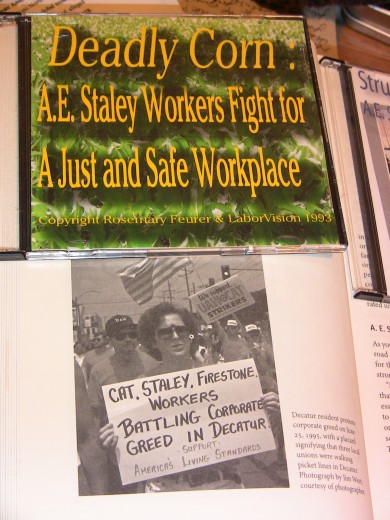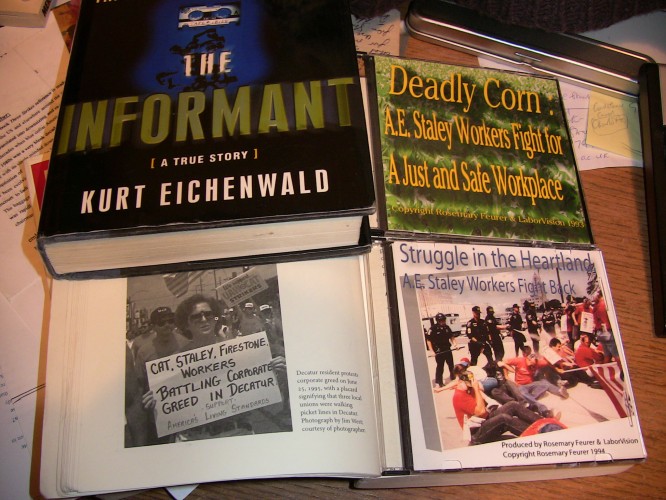Love Lane Lives
The history of sugar in Liverpool and the effects of the closure of the Tate & Lyle sugar refinery, Love Lane
The Informant is a corny film that’s really about SUGAR!
Written by Ron Noon at 11:02 on Wednesday, November 18th 2009
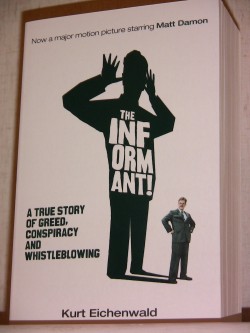
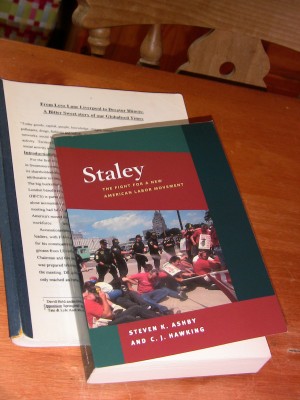
SCENE SETTING:
“We see the public being progressively shocked by one new corporate scandal after another. Yet these scandals although much larger in dollars and cents to those which have been rampant in corporate agribusiness for the past several years, directly affect far few people (thousands of investors, stockholders, employees) as compared with those millions of people who eat the products each and every day that these scandal-ridden companies manufacture.”
SCANDAL DU JOUR “The Fix is now institutionalized” The Agribusiness Examiner June 28, 2002.
“One of the recurrent themes addressed in these blogs will be the ‘politics of sugar’…and the connections between what Sidney Mintz, the ‘doyen’ of sugar studies, terms “sweetness and power’.”
But what about the politics of corn and of Harvest King now that the Fix is in?
Brewster Kneen’s splendid “biography” of Cargill, the massive agribusiness giant that once employed Dwayne Andreas, and former Tate & Lyle CEO, Larry Pillard, notes that CORN was “once something that people ate directly, fed to animals, or dried so that it could be either ground for tortillas and cornbread or stored for long periods before being used for either animal or human consumption. Now corn is one of the basic agricultural raw materials out of which almost anything, it seems can be made”.
Almost anything includes a syrup much sweeter than sucrose which with the help of subsidies and a protectionist American Sugar Program in the 1980s, served to boost not only its growing share of the huge home market, but also of the world sweetener market. According to Stephen Ashby and CJ Hawking’s excellent book on Staley, “an American consumer could not go through a day without using or eating dozens of products that originally come from corn…Cornstarches and corn sweeteners were essential in food processing innovations such as frozen and microwavable foods, instant mixes, shelf stable products, and low-calorie, low-fat products. Companies using paper, cardboard, textiles, gypsum and plaster board became major users of cornstarch”.
HIGH FRUCTOSE CORN! OK that’s the new corny sweetener on the block in the 80s but what about the town where it’s made and the people of that town?
“Beyond where the prairie roads widen and lonely gasoline stations, fast food stores, and windswept taverns begin cropping up, beyond the anonymous box-like moderately priced motels that surround everywhere junction USA, sits Decatur”.
Before big chunks of the Midwest were “transnationalised” in the 1980s, Stephen Franklin’s description of Decatur (Three Strikes 2001) would have conveyed traditional values, traditional prairie architecture, local industries and above all else corn! Ashby and Hawking comment that as you drive “any of the four lane highways into Decatur, vast cornfields line the road and extend to the horizon” and it is in fact “your nose” that tells you you’re nearing town, as “the sickening-sweet smell of processed corn fills the air”! Corn and Decatur go together like bangers and mash and just under 12 months since the first blog, this new kid on the sweetener block, High Fructose Corn Syrup (HFCS), produced by the hydrolosis of starch in the corn/maize, wet milling process, is still the main fix for Coke and Pepsi Cola! Staley’s Chief Executive Donald Nordlund confidently argued in 1980 that “HFCS was as much of a technological breakthrough as the transistor and videotape”! Eight years later Tate & Lyle became the owner of the historic Decatur corn wet milling company, in a controversial leveraged takeover, facilitated by ‘golden parachutes’ to senior Staley executives.
Once upon a time Staley’s like Tates, had prided itself as PATERNALISTIC. The withering away of that company spirit meant that despite its new chairman’s reassurances to the bargaining committee, over a beer in the Union hall, that “they would notice very little change in their life at Staley”, the takeover inexorably resulted in downsizing, re-engineering and eventually on June 27th 1993, the deployment of the ultimate weapon of mass destruction, in the employers armoury, the company lockout. It was that version of corporate greed which really did threaten to tear Decatur and its community apart.
“The Pride of the Prairie” and “Soybean Capital of the World”, was to become the site of bitter industrial struggles in the early 90s involving not just the sugar giant headquartered in London, but two other giant transnationals, Caterpillar and Firestone. Thirty percent of the town’s workforce in 1993 was in manufacturing, twice the national figure, prompting a Chamber of Commerce spokesperson to claim that “Blue Collar Decatur” was a MINATURE CHICAGO! Caterpillar in the same year that the FBI wired up Mark Whitacre as a CW, (Corroborating witness), for alleged “price rigging”, threatened to break their workers strike action with “replacement workers”.
Regan had sacked air traffic controllers in 1981 but Caterpillar raised the stakes to a different level by threatening “to toss out its striking workers” in 1992, a clear measure of the new corporate zeitgeist that resonated in what became known as the Decatur “WarZone”. Work and with it the lives of America’s working people was rapidly transformed by this brutal style of industrial relations premised on the spectre of “replacement workers” and “Lean” production methods.
This was “legitimated” by an unprincipled drive for success and “global competitiveness”. But what does that phrase mean in industries dominated by giants like Caterpillar, Firestone and Tate & Lyle? We all suffer from an insoluble shortage of TIME and workers time was being stolen. Is n’t TIME THEFT a CORPORATE CRIME too? Whereas previously the fight had been for the 8 hour day in Decatur the fight was to resist rotating 12 hour shifts which Staley’s management unilaterally imposed a few months before the lockout. Owen Bieber an automobile Union President speaking at the Economic Club of Detroit in 1992 delivered a corruscating response to the mantra of global imperatives. “I’m getting a little sick of hearing the word ‘global’. I’m sick of global competiveness” and this “anti-union takeaway stategy is a crime of domestic opportunity”. In other words it was all GLOBALONEY.
“Well into the mid 1980s, everything in the small industrial city of Decatur Illinois, right in the middle of farm country, seemed local and as American as apple pie”. It was a traditionally conservative city in many ways closer to the Southern states in its mindset than its sophisticated metropolitan neighbour, Chicago, 175 miles to the North. Corporate greed and crime would change all that and I hope by the end of the week, despite its apparent Peter Sellers, 1960s comedy style, that I’m not the only cinema goer to have grappled with cinematic representations of the politics of a corny film called The Informant!
………………………………………………………………………………………..
SATURDAY NIGHT AT THE MOVIES:
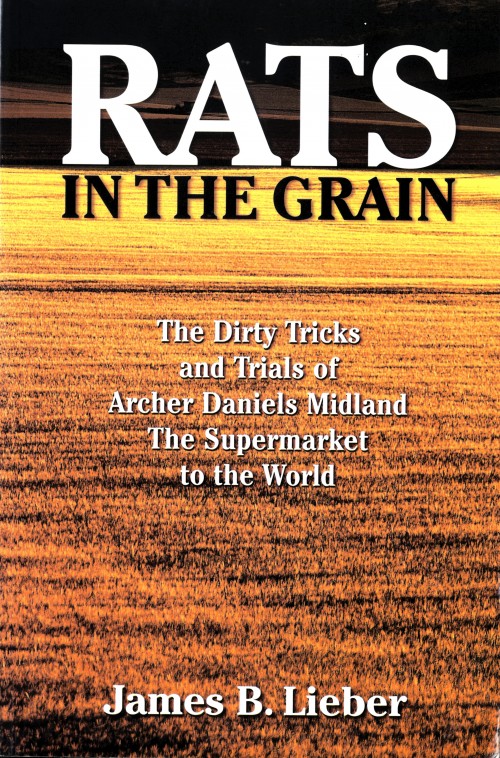
THE INFORMANT! starring Matt Damon and directed by Stephen Soderbergh, will hit UK cinema screens this Friday November 20th. New York Times journalist Kurt Eichenwald’s book of that name, (minus the exclamation mark), did have some stiff competition when it first came out nine years ago, from a verminous sounding title by Pittsburgh lawyer James B. Leiber, who also wrote about the mid 1990s price fixing scandals. RATS IN THE GRAIN: THE DIRTY TRICKS AND TRIALS OF ARCHER DANIELS MIDLAND was described by The Publishers Weekly at the time as “a steamy stew of sex, lies and videotape, revealing corruption that taints an entire industry”.
Let’s hope that Stephen Soderbergh, winner of the Palme d’Or at the Cannes Film Festival in 1989 for the quintessential “steamy stew” classic, has picked the right book. Perhaps he ought to have read and directed RATS! Anyway from what I’ve read Eichenwald and Leiber are not bosom pals and although the former does n’t mention the latter in his book, Lieber does at least mention Eichenwald in his. When Mark Whitacre, (Matt Damon), ADMs head of bio-products was doing his whistleblowing and delusionally acting out a Mitch McDeere role (a la John Grisham’s novel, The Firm), the alleged ADM company mantra was “our competitors are our friends, and our customers are our enemies”! That lapidary sentiment does not appear in economics textbooks and it does not seem to have rubbed off on how these two distinguished writers of agribusiness crime view each other!
More important than their continuing spats however is the fact that neither of them have fully contextualised Decatur as an Industrial Relations “War Zone” where in the early to mid 1990s thousands of blue collar workers became victims of a corporate solidarity that went way beyond price fixing. “In June 1992 Tate & Lyle and ADM announced that the two companies…would build a 3.5 mile, $600,000 pipleline between their Decatur corn processing plants.” That pipeline and I remember seeing pictures of it when I first set up a Liverpool Solidarity Support Group for the locked out AE Staley workers at the end of 1995, was designed to “carry 12,000 gallons of starch slurry per minute in EITHER direction”. It was blatantly obvious despite both companies’ denials that “it was their solidarity versus ours” and that “the purpose of the pipeline was to supply Staley” during a strike or lockout.
Leiber reminds readers of a broader remit than just Dwayne Andreas’ Archer Daniels Midland, which although not directly involved in the labor disputes, fully backed its competitor AE Staley. The “anti-trust prosecutor and FBI resolved to try to ‘flip’ additional witnesses against ADM…The Justice Department through grand jury subpoenas had seized records from a host of companies involved in manufacturing, lysine, citric acid, and high fructose. They included…England’s Tate & Lyle PLC”. He also emphasises how in “a tabloid culture, trials of gruesome crimes generate the most news…But bloodless white collar trials say more about the way the world works, and it is my personal bias that it makes sense to pay more attention to them”. Precisely.
………………………………………………………………………………………………
APPENDIX ONE.
The Informant and Rats are books about corn but they are really about an older kid on the sweetener block
“Federal sugar programs became one of Washington’s most sacred cows. Through price supports and quotas, the programs kept the cost of sugar high – gifting billions to sugar producers while pushing consumer product companies to save money by using high fructose corn syrup, a sweetener made by ADM. In time that created a billion dollar a year market for ADM, which sold its product at a higher price than would have been possible absent government intervention. In the decades that followed, many Americans would comment that the Coke or Pepsi they drank as children somehow tasted different, not knowing that the change had been largely the result of a switch of sweeteners dictated by government policies that favoured ADM.” Pages 24,25 in Eichenwald’s 2000 edition of THE INFORMANT.
APPENDIX TWO
I arrived at a conclusion in relation to the informant in December 1997: “There was always a hollow ring to arguments premised on the ‘press of competition’ in justifying Staley’s full frontal assault on the rights of its workers. That ‘argument’ is now completely vacuous. Whitacre’s unusual research into the operation of a supposedly ‘dynamically competitive’ agri-business Giant, and the operation of its ‘internal market’, has clearly uncovered the very visible hand of a price rigger. The ripple effects on Tate & Lyle and other ‘competitors’ in the secretive world of agri-business have still to work their way through.”
Nine years after the case had started out it did just that and on Thursday July 29, the Washington Post’s Business in Brief section had this information below the headline Sweetener Case Finally Over!
“Tate & Lyle, Europe’s largest cane-sugar refiner, paid $100 million to settle a lawsuit over sweeteners used by Coca-Cola and PepsiCo in the biggest food antitrust class action in U.S. history. Tate & Lyle, based in London, was the last to settle a civil suit filed in 1995 by the Department of Justice on behalf of food companies, including Coke and Pepsi, alleging its A.E. Staley Manufacturing unit conspired to fix prices of high-fructose corn syrup, a sugar substitute.”
The London Times reported how “Tate & Lyle protested Staley’s innocence, saying the settlement had been agreed for pragmatic reasons”. Robert Gibber, the Tate & Lyle general counsel said: “We deny emphatically involvement in any wrongdoing and believe we were in a position to demonstrate this at trial. However, particularly in the light of recent settlements by the other defendants, a jury trial would have exposed Staley to a degree of risk.”
What degree of risk were Staley workers subjected to in the era of the WarZone?
I dealt with some of those issues in the June blog BITTER SWEET PENSIONER STORIES where reference is made to Larry Pillard relinquishing his CEO spot at Tate & Lyle in 2002. Pillard had been brought in as chief executive at AE Staley ten years earlier, having formerly been “trained” at Cargill. His success at resolving the “thorny Staley problem” resulted in his eventual promotion to the top job in Tate & Lyle in 1996. Why did he stand down on June 14 2002? Alan Buebert in an essay entitled ALLEGED FRUCTOSE PRICE FIXERS REMANDED ON TRIAL, June 21st 2002, teasingly suggests that “just seven people – all with close personal and business ties to each other – have controlled American fructose production and pricing for two decades. Little wonder fructose buyers allege fructose sellers fixed prices”.
June 18th 2002 four days after Pillard stood down. A Federal appeals court in Chicago ordered the fructose price fixing civil suit to be heard.
27th June 2003 - Exactly ten years to the day that the Staley workers had been locked out, a report published in the London Evening Standard revealed, that the man vilified in Decatur, as a union buster and “damaging to your health” had received from Tate’s, ‘a £1.5 million pension sweetener’ after unexpectedly announcing he was stepping down as chief executive of the sugar giant. Allegations were heard that the timing of his move might have been related to an imminent class action case in America about the rigging of HFCS prices, by ostensibly rival companies, when he was chief executive at Staley.
ESSENTIAL FURTHER READING AND VIEWING (BEFORE OR AFTER WATCHING THE INFORMANT DEPENDS ON WHOSE TIME IT IS ANYWAY!)
You can see in the photograph my 2000 edition of THE INFORMANT placed over a poignant picture of the tri-union struggle contained in Ashby and Hawking’s STALEY, and then over to the page on the right are placed two excellent video’s recorded by Rosemary Feurer and LaborVision based in St Louis.
